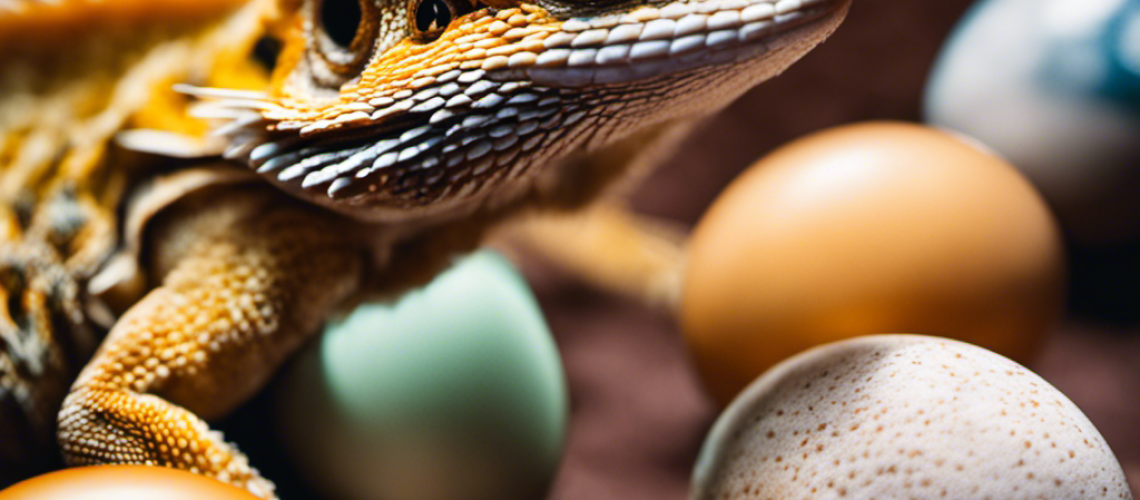Are you wondering how many eggs bearded dragons lay and how often? You’re not alone! This is a common question among those who own or are considering owning a bearded dragon. Knowing the answers can help ensure your pet’s health and well-being, as well as ensure that you provide adequate care for them.
Read on to learn about:
- Egg production in bearded dragons and the factors that affect it
- The egg-laying process
- Tips for storing their eggs.
Key Takeaways
- Bearded dragons typically lay between 8 and 20 eggs at a time.
- Dragons usually lay eggs every four to eight weeks.
- Factors such as age, mating behaviors, and nesting site availability influence egg laying.
- Keeping records of egg-laying habits helps monitor a dragon’s health and reproductive cycle.
How Many Eggs Do Bearded Dragons Lay
Bearded dragons typically lay between 8 and 20 eggs at a time. Egg development can take up to three months during the incubation process, depending on temperature and humidity levels.
For successful egg incubation, it is important to keep the environment warm and humid. To maximize hatching success, it is recommended that the eggs be regularly rotated throughout the incubation period.
With proper care, bearded dragons can produce multiple clutches of eggs each year!
How Often Do Bearded Dragons Lay Eggs
You’ll find that your dragon typically lays eggs every four to eight weeks. This depends on various factors, such as the dragon’s age, mating behaviors, and access to nesting sites.
If conditions are optimal for egg production, a female may lay multiple clutches during the same breeding season. The eggs should be incubated at temperatures between 85-88°F in order to hatch successfully.
Keeping records of your dragon’s egg-laying habits is beneficial for monitoring its health and reproductive cycle.
Factors Affecting Egg Production
Age, mating patterns, and nesting site availability can all influence a dragon’s egg production. Proper nutrition helps ensure female dragons are able to produce viable eggs. Heat cycles, diet quality, and other factors like stress levels also play key roles. Additionally, good nesting sites provide security which aids in successful hatching. Dragons typically lay fewer eggs as they age, but with the right environment they can still be productive during every heat cycle – even into old age!
The Egg Laying Process
When you experience a female dragon’s heat cycle, she will usually lay eggs shortly afterward.
The process for egg laying includes:
-
Hibernation Effects:
-
Going into deep sleep or torpor
-
Reduced metabolism and temperature regulation
-
Temperature Regulation:
-
Necessary to trigger the release of stored calcium from bones
-
Stimulates the ovaries to produce viable eggs.
Egg Care & Storage
Once the eggs are laid, proper care and storage is essential for successful hatching. Incubating the eggs in a warm, moist environment with humidity levels of 40-50% helps provide optimal egg nutrition.
Gently turning the eggs several times per day helps ensure that embryos develop evenly and prevents them from sticking to the inside of their shells.
It’s important to monitor temperature and humidity levels closely throughout incubation in order to ensure successful hatching.
Storing the eggs at temperatures below 80 degrees Fahrenheit in an area with low moisture will help prevent fungal development and keep them viable until they can be incubated.
Frequently Asked Questions
What Environmental Conditions Do Bearded Dragons Need to Lay Eggs?
To breed, bearded dragons need a temperature gradient, humidity, and a place to dig for incubation. Provide these conditions and your dragon is ready to lay eggs! Incubation requirements vary by species, so make sure you know the specific breeding requirements for successful incubation.
How Can I Tell if My Bearded Dragon Is Going to Lay Eggs?
If you notice your bearded dragon’s hibernation patterns and diet changes, it may be a sign that they are getting ready to lay eggs. Monitor their behavior closely to determine if this is the case.
What Should I Do if a Bearded Dragon Egg Does Not Hatch?
If a bearded dragon egg does not hatch, check the incubation environment for temperature and humidity variations. Ensure that the eggs are receiving proper nutrition during incubation as well. If all conditions appear normal, it’s possible that the egg was not fertile or viable.
Are Bearded Dragon Eggs Fertile?
Yes, bearded dragon eggs are fertile. The mating habits and incubation period of the species determine the fertility of the egg. Proper care during these periods is vital for successful hatching. So make sure to follow all necessary steps for a successful result!
How Can I Tell if a Bearded Dragon Egg Is Infertile?
You can tell if a bearded dragon egg is infertile by monitoring its development during the incubation process. Proper egg storage and temperature are key for successful incubation; if the eggs don’t develop after several weeks, they are likely infertile.
Conclusion
You now know how many eggs a bearded dragon can lay and how often they do it. Egg production is affected by several factors, including age, health, habitat, and nutrition.
The egg-laying process itself is an important part of the life cycle of these reptiles. Lastly, proper care and storage of the eggs are essential for successful hatching.
With all this in mind, you’ll be well on your way to providing the best possible environment for your dragon’s reproductive success!






